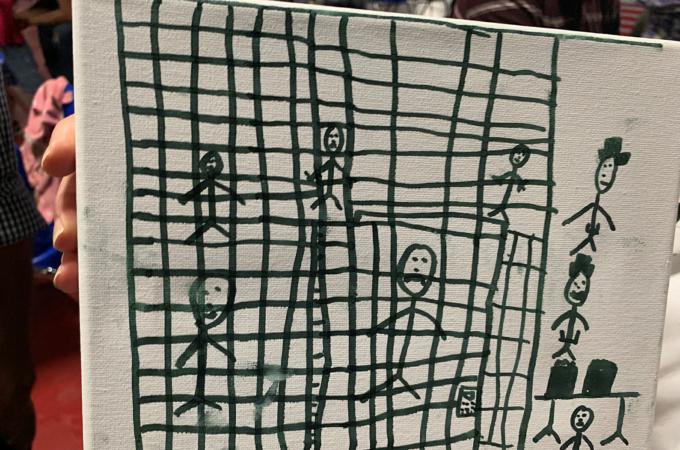Welcoming the stranger
I know many of you have likely already seen media coverage of the conditions of the holding facilities for immigrants across the South Western border. Each of the 22 Catholic Charities agencies in that region are working to both welcome and shed light on the terrible conditions and treatment of children and families seeking asylum in the United States.
The widely circulated children's drawings depicting the inhumane conditions in the detainment centers dotting the U.S.-Mexico border were drawn by children at the Catholic Charities Humanitarian Respite Center in McAllen, Texas, run by Sister Norma Pimentel, where many families go after being released from Border Patrol custody in McAllen.
The Gospel calls on us as Catholics to provide hospitality to newcomers as if we were welcoming Christ himself. The Catholic Church, like our nation as a whole, finds its identity and roots in various immigrant communities, we affirm the inherent dignity bestowed by God on every human person, including immigrants and refugees, no matter which circumstances compel them to leave everything behind and begin a new life in our community.
We are called by the Scripture to be the helping hand, to be the welcoming neighbor, and for decades, Catholic Charities Archdiocese of Boston has worked closely with refugees and immigrants coming to our community in search of a better life. In every case that we encounter, these newcomers have been forced to turn to Catholic Charities for aid in escaping horrible situations and extreme circumstances, such as religious persecution, violent oppression, crushing poverty, the rage of war, or the fallout of natural disasters.
In their time of need, when these people are left with no other choice, they show up at our doorstep.
CCAB offers a wide array of services to people seeking to rebuild their lives, increase their inherent skills, and obtain legal status in the United States.
Upon arrival in the U.S., immigrants face a daunting array of linguistic, economic, cultural, and legal challenges. Through Immigration Legal Services, newcomers receive high-quality legal consultation, referral, and representation for an array of immigration benefits, such as political asylum, naturalization, and family reunification.
Our Refugee Resettlement program has assisted refugees from all corners of the world, including Burma, Bhutan, Cuba, Ethiopia, Haiti, Iraq, Syria, Liberia, Somalia, Sudan, and Vietnam, among other nations. Through this program, people seeking to escape hardships in their homelands are given aid in legally immigrating to America, and are provided with a modest apartment furnished with basic necessities, assisted with acculturation, and referrals to specialized employment and English language services. Along with this critical assistance, refugees receive compassion, understanding, and positive reassurance from our staff to help in the attainment of independence and financial self-sufficiency.
Newcomers are directed to our English for Speakers of Other Languages classes, which provide non-native speakers of all backgrounds and skill levels the support and instruction necessary to master the English language, find employment in their new home, and become fully independent Americans.
They are also connected with the Parishes Organized to Welcome Immigrants and Refugees program, or POWIR, which engages local churches to recruit and utilize volunteers to mentor and provide other needed support to newly-arrived refugees. The program places a special focus on building parish partnerships whereby a parish sponsors a refugee family for a designated period of time that helps refugees feel a true sense of welcome and build social capital, fostering long-term integration.
In addition, our Community Interpreter Services program assists limited English speakers in accessing mainstream legal, health, educational, and other services. Our highly skilled interpreters serve as a crucial link between service providers and limited English speakers. This program not only serves as a bridge to communication but allows those clients with multilingual ability to work as a CIS interpreter.
We at Catholic Charities continue to serve immigrants in our community, and advocate on behalf of just and humane immigration policy reforms that will restore the dignity of those who are having it stripped away -- the men, women, and children who are being locked in cages at our borders.
For more information about the work we do, visit ccab.org.
- Deborah Kincade Rambo is president of Catholic Charities of the Archdiocese of Boston.



















